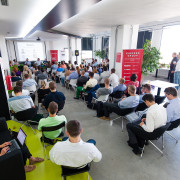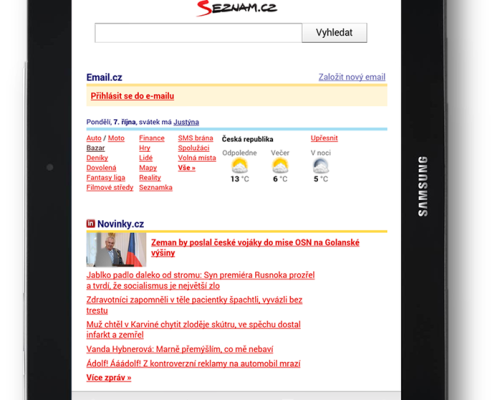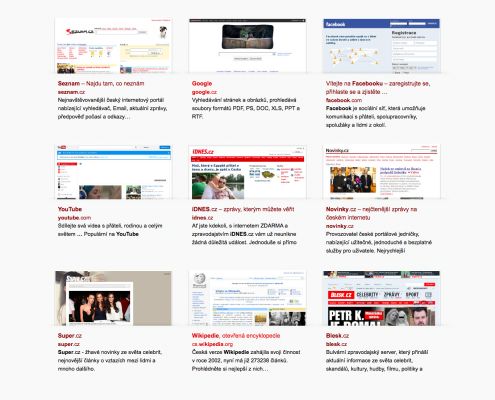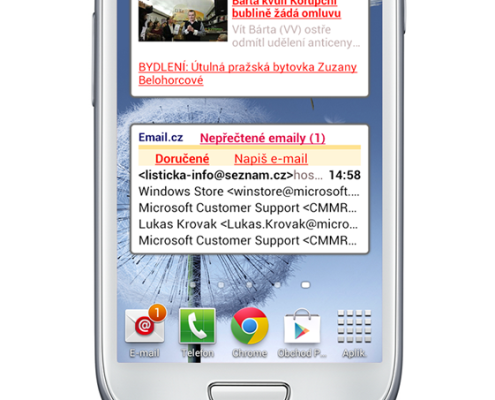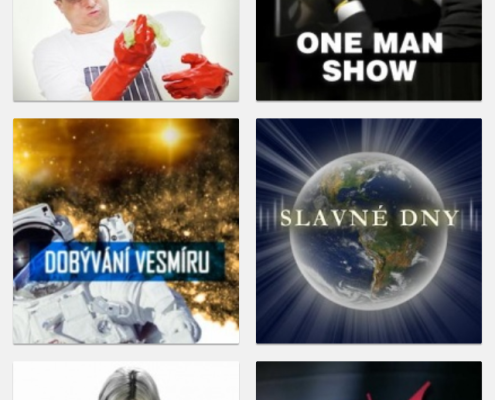Full disclosure: Seznam is a major investor in StartupYard, and this piece and interview are a promotion for our accelerator candidates, who will get access to Seznam’s search technology, and will work with Seznam staff through Startupyard. Nevertheless, Seznam is a phenomenon worth reading about and being aware of, as they define what alternatives to Google can do, to the advantage of smaller local markets.
Google is the biggest search company in the world, by more than a big margin. Of course you know this, and perhaps you’ve heard that Google is so big, that it dominates search traffic not only at home in the US, but in every market in the world except Russia, China, and South Korea. That makes sense: none of these countries use the latin alphabet, and their huge online markets are fertile ground for competitors, keeping Google from reaching dominance, and even so, Google is making huge in-roads in all of those markets. And Google owns the west outright.
With one exception.
How Do you Beat Google? Give People What They Want.
Founded in 1996 by Ivo Lukačovič, Seznam.cz has grown to become the only latin-alphabet based full-text search service in the world that is beating Google in its own market: the Czech Republic. Seznam means “List,” in Czech, but has a richer meaning: as in a catalogue or directory of information. Today Seznam employs over 1000 people, and has revenues in the hundreds of millions of dollars annually.
With a population of just 10.5 million (with perhaps a million Czech speakers elsewhere worldwide), the Czechs don’t seem likely candidates for a powerhouse search engine. But careful attention to the specific needs of the local market has brought Seznam to the top, with a suite of online services dominating news, advertising, local retail and exchange, maps, email, and search in the Czech Republic. Around 90% of Czechs are regular users of Seznam.cz and its various services, and they enjoy a range of services at a quality level unmatched by local services in much larger neighboring countries, including Germany (8 times larger in population) and Poland (4 times larger).
Seznam generates 60% of all Czech page views, and a dominant position in online advertising, serving 90% of the Czech market regularly. It is synonymous with the internet for Czechs online, in the way that Google has become in many other countries.
Seznam’s local presence makes the Czech Republic fertile ground for competition, and has been a singular advantage to the Czechs, bringing Google Street View to Prague before it arrived anywhere else in Central Europe, and helping to make Czech language services on Google far more sophisticated than in neighboring Slovakia or Austria. A plethora of apps from Seznam, specialized for the Czech market and language, offer Czech consumers a set of mobile options rivalling markets many times their size, and keep the Czech Republic burning brightly as a place for cutting-edge innovation, despite its size.
A Q&A With Seznam

Irena Zatloukalova, Seznam spokesperson and mentor at Startupyard.
I caught up this week with Irena Zatloukalová, a spokesperson for Seznam.cz, and a mentor in PR and communication at Startupyard to talk about Seznam’s amazing success, and their cooperation with Startupyard. Here’s our exchange:
How long have you been with Seznam? What’s it like working there (and in the Czech Republic in general)?
It will be 3 years in 2 months. Seznam.cz is a very different place to work at. I worked for three other companies before Seznam.cz and nowhere else was I able to find such a combination of all the attributes of my work here. People here like their jobs, and like the brand they are working for – that is why you can always expect them to want the best for the company.
By pulling from the same end of the rope, everyone is motivated to always find a solution and get the things needed to be done, done. So you don’t do purposeless work. And the atmosphere at seznam.cz is very informal. And I also believe that the management chooses very competent people, to whom they give responsibility for specific fields, and then listens to their expertise and trusts their opinions and knowledge. In most companies I’ve worked for, at least one of these attributes has always been missing.
That’s interesting. How does Seznam keep itself from falling into the trap that so many companies fall into, of not trusting their employee’s judgment? We’ve all worked in places where our boss didn’t want to let anyone else have a good idea. How do you overcome that instinct?
I do not know, what the trick is. I suppose it comes from our management team. Pavel Zima as well as all the other members of the management just live the values of informality. Whoever comes with a good idea, can go directly to anyone in the company. You do not need to wait in a long line, or consult 6 other people before getting to the person that can decide what you have come up with. Also, you directly know who is the one you need to see on what issue. So you just go directly to them. No matter if they are juniors or if the one you need to see is the GM. If the idea is good and viable, it will be taken and you will not be reproached if it is not. This method leads to results very fast. And as I have said, maybe seeing that what you do has a meaning and you do not have to waste your time, is the secret ingredient to overcome that suppressing instinct.
But from the perspective of someone responsible for internal communication, I have to say this environment is very challenging too – everyone feels free to tell you, they would communicate every single thing differently. But trust me, that is the smallest tax one is willing to pay in a company where informality and openness are not just phrases you say, but the values the employees live.
We did a piece recently where we argued that Prague was the next great place for “the startup life;” a place that’s perfect for young companies to grow. Do you agree with that?
Prague is full of very interesting people. On the Prague startup scene, I have met many interesting people who not only having good ideas, but are also able to bring them to life. So I would agree. And moreover, the Czech Republic has many successful IT companies that have been launched as startups, or one-man ideas, and have made their way to companies known to the Czechs and outside the Czech Republic – I mean not only Seznam.cz but also AVG, GoodData and many others.
Seznam is famous for being one of only a few search services around the world besting Google in its own market. How did Seznam reach this position in the Czech Republic?
As our General manager Pavel Zima says, we have not given up on our products.
We have been developing our products constantly throughout the last 17 years. We have not given up on our own full-text search engine and robot, our maps or email. Within the last two years we have even sped up our innovations, so that we could introduce very simple, intuitive and as up-to-date versions of our services as possible for our users.
Also, we have stayed focused on Czech users and their needs. Our services have become an everyday part of the lives of most Czechs. We offer services for those looking for a new car, a flat, or consumer goods. At our home page we provide people with the basic service, so they know all the current info – weather forecasts, news from different fields, TV programs and so on.
The other very important thing is that our users are the starting point for us. With the services we provide, we always try to solve some problem or task one uses the internet for. And only when we are happy with the way things work (as we use our services, and try to find the best way to make them work for everyone), do we let the users try the service, and monetization comes only after that.
You mention how important Czechs and the Czech Republic is to Seznam. That’s very different from most similar companies, who are thinking globally — who are thinking that growth brings quality. Do you think Seznam’s model is conceivable in other countries, or is the size and culture of Czech Republic just right for this kind of service?
That is hard to say. Ivo Lukačovič, the founder of Seznam.cz, had a very good business instinct. At the time he founded Seznam.cz he had a very good idea; he put together services people learned to use and he was brave enough to try and find a way to finance his hobby (find out more about this history). Much later, when there was more competition on the Internet, Seznam.cz has made the deliberate and rational decision that it wanted to focus on the business and environment it knows the best.
I am not sure if it is a recipe for everyone, but it worked for Seznam.cz. We started as a small company and grew big only on one market. I suppose every company has to find its way. Copying anybody does not work in a long run. You need to have your passion and a bit of luck, which you wittily use for your aim. That is something that I suppose happened to Seznam.cz and it does not have to necessarily be because it has happened in the Czech Republic. Yes, Czechs are specific – not many Czechs spoke English 10 years ago. But even now when English is much more common, they still use our services. We differ from our completion in many ways. Maybe diversity of business might be more important than just sole global growth. We live on Full text search and PPC advertising, display adds, yellow-pages-like on-line catalogue business and advertising at field-specific servers (Sauto, Sreality and so on). And these four legs of our business are approximately of the same size in revenues. That combined with focus on our users and innovations are the key to our stable growth, in my opinion.
What is Seznam doing today to stay ahead of competition from the likes of Google, Facebook, or Yahoo?
We try to use our knowledge of the Czech market and Czechs to our advantage. For example: Czechs are very keen tourists, and at the weekends you can find many people with their small backpacks in the woods, following the tourist marks, going for a short hike or trip. For an international company it doesn’t make sense to come out with a special tourist map just for Czechs (as outside the CEE there are not many countries with such a sophisticated and well-maintained system of tourist markers in the countryside). Seznam.cz made that an important part of its web maps and also built a mobile map on the touristic data we have, with an offline mode. This is something that does not make sense for Google, but it makes sense for Seznam.cz and also wins us positive points among Czech Internet users.
Can you tell us about some other interesting projects Seznam has been working on?
Lately we have made a lot of product innovations. The big ones have been started within the last 3 years with Super.cz (a tabloid- web-news server). We have done it totally differently than any other similar site. We have completely skipped categories on the site, just providing the users with a stream of news and photos. With a big photo leading to the main article of the day in the background. Since then we have really started to innovate and simplify our products. For the latest innovations, you can see our English press release on innovations.
And in the last 3 months we have come up with about 7 new mobile apps. See them all here.
Seznam is a major partner of Startupyard, how did the company get interested in Startupyard, and what do you hope to gain from the partnership?
The cooperation started 3 years ago. By then we had talked to other Prague accelerators, and the Prague Hub, to find out if there were any ways to share our know-how with the companies present there. At StartupYard, the deal was the fastest and made the most sense, as it continues to do. The first year was mostly about know-how; sharing and mentoring. To add to that, we became an investor in SY last year ,and for next year, we will also provide the teams with part of our technology. We believe it can help some people with very good ideas, to make their ideas become successful and viable projects.
To see what more we plan to do in 2014 with Start ups, please see our blog post from December (in Czech) – http://seznam.sblog.cz/2013/12/18/604.
[ssba]










